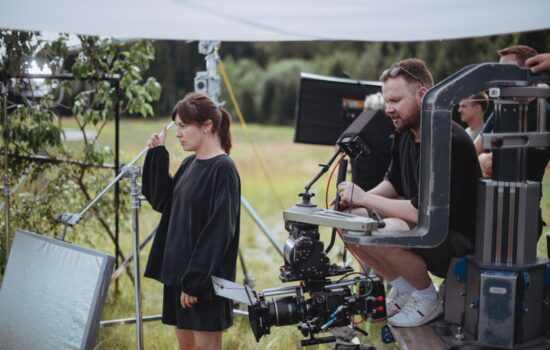Manager
Career Overview
A Manager oversees the professional lives of their clients, which can include brainstorming new projects, guiding the progress of existing assignments, providing notes on those assignments and offering general creative feedback and support.
Alternate Titles
Talent Manager
Avg. Salary
$250K-$300K1
Salary Range
$50K – $1M+1

How To Become a Manager
People also ask
Career Description
For Ryan Cunningham, Manager and Producer at Madhouse Entertainment, the day usually begins at 8:30 a.m. with a morning’s worth of emails to read, calls to make and meetings to attend. During these hours, he might be talking with his clients, other Producers or executives about the various projects that he and his clients are working on.
Lunchtime means meeting with an industry contact and then it’s back to the office where he’ll continue to return calls and emails or read through his clients’ work to give feedback before heading home around 6:30 p.m. Like most Managers, though, Cunningham’s day doesn’t end there.
On the drive home, more calls are made. Once home, he’ll break for dinner and family time before getting in a few more hours of work, which usually means reading a script or writing up notes before his day is truly done.
What does a Manager do in film?
In the world of filmmaking, the Manger is the person who works closely with an Actor, Director, Screenwriter, or other type of talent to promote and develop their skills in a professional capacity. The Manager is thought of as the person who helps their clients consider their long-term professional goals and shape their careers to reflect those goals.
Salary
The average annual salary for a Hollywood Manager is between $250,000 and $300,000. The salary range for Managers runs from $50,000 (beginner Managers) to $1,000,000+ (top Managers).
Cunningham stresses that the income a Manager can make will vary greatly depending on where they work, how long they have been working there and how big their roster of clients is.
A Manager’s income is largely based on performance. At the top of their game, they’ll receive a base salary, as well as a year-end bonus that generally is determined by their clients’ earnings from that year. Because Managers are often working with newer talent who may not have the experience or developed talent yet to make larger incomes, it can take time for a Manager’s earnings to grow.
However, should their clients achieve a substantial amount of success, “there’s no real ceiling on earning potential,” says Cunningham.
Hey, what do you think about trying our new Film Career HelperFilm Career Helper really quick? It’s totally free and could help get your career moving fast! Give it a try. It’s totally free and you have nothing to lose.
Career Outlook
When it comes to work-life balance, Cunningham admits that his day-to-day schedule often tips towards work. “But it’s not just management,” he states. Many people who work in the industry put in after-work and weekend hours. The same is true for Cunningham. That’s why he cautions, “You have to love what you do.”
Besides the hours that he puts in after coming home from work, he usually puts in additional weekend hours to look at scripts and provide feedback. It’s a responsibility that he takes seriously because he’s “the link to my clients’ livelihood.” And as a Manager continues to grow their roster of clients, that typically means more hours put in outside the office. For anyone considering a career as a Manager, it’s an important factor to keep in mind.
As far as who Cunningham most often collaborates with, at the top of the list is his clients. But as mentioned earlier, he also communicates and works with other Producers and industry executives to help push out his clients’ work.
What is the difference between a Manager and Agent?
A Manager can be thought of as a career coach for talent. They are the person with whom a client will likely be working with most closely over the course of their career to both produce work and shape their overall professional path. An Agent is the person who can formally submit an Actor, Writer, or other type of talent for a job and negotiate contracts for them.
Career Path
Cunningham’s path to becoming a Manager began while he was still in college. It was then that he began applying for and getting internships that would become the first stepping stones to his current career. He also worked as a Production Assistant on a number of films and television shows. Through these experiences, he realized that he was interested in learning more about the creative side of the entertainment industry.
After working at an agency for a period of time, Cunningham made the jump to management. That was twelve years ago. There he “learned the ropes” from the senior Managers on staff. As he puts it, it’s an “apprentice system” that is pretty standard for the industry.
Says Cunningham, “Any job early on in your career can help you figure out what you do or not want to do.”
As he has already mentioned, internships are a great way to gain experience and meet people in the industry. And for the person who is motivated to one day become a Manager, working as an Assistant at either an agency or management company can be helpful. Not only can that position introduce a person new to the industry to higher-level professionals, but also it can make clearer the differences between a Manager and an Agent.
In general, Cunningham states that Agents focus more on making sales and looking for jobs for their clients, while Managers usually spend most of their time guiding their clients’ creative aspirations. So when looking for those entry-level jobs at either an agency or management company, it’s important to be aware of those differences.
For someone looking to become a Manager, Cunningham has some tips:
- Apply for an internship — whether you’re in college or a few years out of it.
- Stay current with the trade publications.
- Read as many scripts as you can!
What makes a good Manager?
A good Manager both listens to the needs of their clients and encourages them to reach beyond their comfort zone should they feel they have the capacity to work in different genres or mediums. They also provide constant feedback in terms of how to better their work for submission or consideration to Agents, Producers, production companies, and studios.
Experience & Skills
“Every Manager is different,” states Cunningham. Some really dive into the development and creative process with their clients, which might mean that they have fewer of them. Others are more volume-driven. In either case, it’s important that a Manager always is building their value for their clients. Even with a full roster of clients, a Manager must continue learning more about the business. Says Cunningham, “I’m still learning every day.”
As an example, he mentions that he has recently been educating himself more on the marketing side of the entertainment industry. By adding this skill set to his expertise, Cunningham is a more effective Manager for his clients.
The person who is most likely to succeed as a Manager is someone who is “entrepreneurial,” says Cunningham. “Nothing’s going to fall in your lap,” so having a strong work ethic and being proactive are key to doing well in this career.
Being able to strike the right balance with clients is also important. That means being “a bit of a cheerleader” while also making sure that they “stay on task,” states Cunningham. And if a particular project isn’t progressing as they would hope, he stresses that having an open mind and seeing what they could do differently is a huge factor in keeping his clients motivated.
In general, though, Cunningham emphasizes how crucial is it to treat everyone with respect. And he really means everyone. Beyond clients, Producers and executives, be courteous with everyone in the business. Why? “Because the Assistant you’re talking to now could be a major Producer one day.”
Education & Training
For someone looking to one day become a Manager, Cunningham states that a college degree is nearly always required. That being said, he stresses that while school can provide opportunities for internships and connections, it’s only when in the trenches at a management company that someone aspiring to be a Manager will really learn the tools they need to be successful.
Also, many colleges and universities do not have specific courses on management, so learning on the job is essential.
Cunningham also stresses the importance of self-education. What does that mean? Reading — a lot! He emphasizes seeking out “any scripts you can find, good or bad” to learn about what makes a story successful. He also suggests reading screenwriting books to learn the rules of good writing, as well as when to break those rules. Lastly, it’s important for someone hoping to one day be a Manager to be familiar with industry players.
That means watching as many films and television shows as possible to become familiar with the Actors, Screenwriters, Directors and Producers who make them. Says Cunningham, “Always be increasing your knowledge.”
Additional Resources
Cunningham states, “There are no specific Manager resources.” But that doesn’t mean someone aspiring to be a Manager doesn’t have options to expand their knowledge. Anyone looking to get into management should familiarize themselves with Deadline, Hollywood Reporter and Variety.
These trade publications provide the most up-to-date information on industry deals and ongoing productions, which can very important for a Manager to know. Cunningham also reminds aspiring Managers how beneficial it is to read scripts as much as possible.
Lastly, Cunningham advises anyone wanting to be a Manager to “put yourself out there.” Build relationships with Actors, Producers, executives, and other industry professionals.
FAQ
What is the single biggest suggestion you would give to someone wanting to get into this career?
“Do your homework,” says Cunningham. Also, find a job in the industry as soon as possible because it’s the best way to know how it works.
What’s the #1 mistake people make when trying to get into this career?
“They try to move too quickly.” Cunningham cautions young Managers to not push too fast for more clients. Take your time to build relationships and a roster. This job “is a marathon, not a sprint,” he adds.
What is the question people should ask about this career but rarely do?
Cunningham offers, “Can I handle this lifestyle?” The people who thrive in this career are the ones who continually check in with themselves to see if they’re still loving it. He states, “Be honest with yourself or else you’ll burn out.”
If you could describe in one word what makes you successful, what would it be?
“Hard-working.”
Sources

Ryan Cunningham
Ryan Cunningham is a literary Manager and Producer at Anonymous Content. Ryan began his career in physical production as a PA on several films and TV shows shooting in New Orleans while he attended Tulane University. After graduating, Ryan moved to Los Angeles where he worked in the story department at New Regency and at Stratus Films.
He joined the Metropolitan Talent Agency in 2005 as an Assistant and was promoted to Coordinator in the literary department.
Ryan moved to Madhouse Entertainment in late 2006, soon after the company’s inception, as a Junior Manager and was promoted to full Manager in 2009. Ryan represents a stable of Writers and Writer-Directors in the TV, film, and publishing worlds.
His clients include Scott Beck & Bryan Woods (writers of Paramount’s A Quiet Place and Writer/Directors of the upcoming Eli Roth/Sierra produced feature, Haunt), David Birke (Writer of Paul Verhoeven’s Elle, Warner Bros’ upcoming Morningstar), Jeff King (CBS’s Elementary), Lynn Maxcy (Hulu’s The Handmaid’s Tale), Adam Penn (USA’s Mr. Robot and FX’s American Horror Story), Dan O’Keefe (HBO’s Silicon Valley and Veep), Drew Daywalt (best-selling author of The Day the Crayons Quit), and Hannah MacPherson (Go90’s T@gged), among others.
Ryan executive produced Sony/Screen Gems’ feature Slender Man. He’s also developing John Scalzi’s award-winning sci-fi book series Old Man’s War as a feature for Netflix, and has several other TV and film projects in various stages of development. He has served as a panelist at the Austin Film Festival.
He lives in Los Angeles with his wife and two children and doesn’t sleep much.
His career has been featured in Deadline, Creative Screenwriting, Writing Cooperative, and Filmmaker Magazine.
References
- 1THR Staff. "Hollywood Salaries Revealed, From Movie Stars to Agents (and Even Their Assistants)". The Hollywood Reporter. published: October 2, 2014. retrieved on: April 15, 2020



















